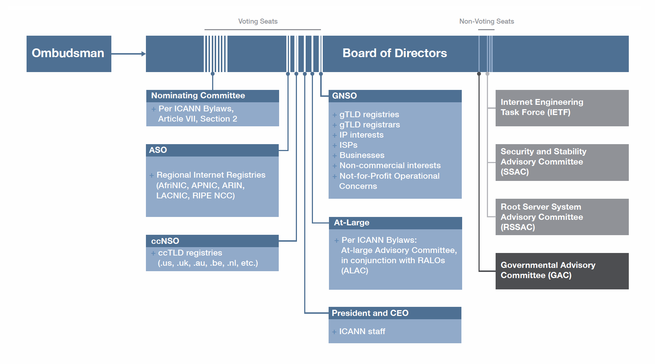ICANN Community: Difference between revisions
| Line 23: | Line 23: | ||
===[[ccNSO]]=== | ===[[ccNSO]]=== | ||
:The Country Code Names Supporting Organization (ccNSO) develops policies, forms consensus, and makes recommendations to the ICANN Board related to [[Country code top-level domain|ccTLD]] | :The Country Code Names Supporting Organization (ccNSO) develops policies, forms consensus, and makes recommendations to the ICANN Board related to [[Country code top-level domain|ccTLD]]s. | ||
====[[ccNSO#ccNSO Council|ccNSO Council]]==== | ====[[ccNSO#ccNSO Council|ccNSO Council]]==== | ||
The ccNSO Council consists of a group of representatives elected from the ccNSO representatives of their respective ccTLD managers, which ICANN refers to as ccNSO members. | The ccNSO Council consists of a group of representatives elected from the ccNSO representatives of their respective ccTLD managers, which ICANN refers to as ccNSO members. | ||
Revision as of 15:25, 9 February 2021

Welcome to the world of ICANN!
ICANN stands for the Internet Corporation for Assigned Names and Numbers. It is a private, non-profit organization for the management of the Internet DNS, IP Addresses and Autonomous System Numbers, and the structures that underlie them. It runs on an international, multi-stakeholder model.

Supporting Organizations[edit | edit source]
ICANN has three Supporting Organizations (SOs).
GNSO[edit | edit source]
- The Generic Names Supporting Organization (GNSO), which replaced the DNSO, develops policies, forms consensus, and makes recommendations to the ICANN Board related to gTLDs.
GNSO Council[edit | edit source]
- The GNSO Council is led by elected representatives from the Contracted and Non-Contracted House Parties.
Contracted House Party[edit | edit source]
- The CPH consists of:
Non-Contracted House Party[edit | edit source]
- The NCPH consist of:
- The Commercial Stakeholder Group, which consists of three constituencies:
- The Non-Commercial Stakeholder Group, which consists of
ccNSO[edit | edit source]
- The Country Code Names Supporting Organization (ccNSO) develops policies, forms consensus, and makes recommendations to the ICANN Board related to ccTLDs.
ccNSO Council[edit | edit source]
The ccNSO Council consists of a group of representatives elected from the ccNSO representatives of their respective ccTLD managers, which ICANN refers to as ccNSO members.
ASO[edit | edit source]
- The Address Supporting Organization (ASO) develops policies, forms consensus, and makes recommendations to the ICANN Board related to Internet Protocol and addresses.
Address Council[edit | edit source]
The ASO is led by the Address Council.
Regional Internet Registries[edit | edit source]
The Address Council consists of elected representatives from each of the five Regional Internet Registries (RIRs):
Advisory Committees[edit | edit source]
ICANN is comprised of four Advisory Committees (ACs).
Goverment Advisory Committee[edit | edit source]
- The Government Advisory Committee (GAC) consists of representatives from various governments who advise the ICANN Board on public policy issues, national laws, and international agreements.
- GAC Members are the government organizations that participate in GAC.
- GAC Representatives convey their respective government's interests to the committee.
- GAC Leaders are a small group of representatives who have been elected to shepherd members toward consensus on ICANN policy developments and convey the committee's advice on a given topic to the ICANN Board.
At-Large Advisory Committee[edit | edit source]
- The At-Large Advisory Committee (ALAC) presents the interests and concerns of individual Internet users, as represented by the At-Large Community.
Regional At-Large Organizations[edit | edit source]
The ALAC consists of three representatives from each of the five Regional At-Large Organizations (RALOs):
At-Large Structures[edit | edit source]
- RALOS are comprised of At-Large Structures (ALSes) and individuals who seek to represent the interest of the At-Large Community.
RSSAC[edit | edit source]
- The Root Server System Advisory Committee (RSSAC) advises the ICANN community and Board on the operation, administration, security, and integrity of the Internet's Root Server System.
SSAC[edit | edit source]
- The Security and Stability Advisory Committee (SSAC) advises the ICANN Board on the security and integrity of domain names and the allocation of IP addresses, including security assurance for operational matters, administrative matters, and registrations matters.
NomCom[edit | edit source]
- The Nominating Committee (NomCom) oversees the selection of various ICANN officers. It is designed to operate independently of all other ICANN bodies and to act in the interest of the global Internet community.
NCAs[edit | edit source]
- The NomCom selects and appoints people to SOs, ACs, and the ICANN Board.
Ombudsman[edit | edit source]
- The Ombudsman is an informal dispute resolution office for members of the ICANN community who wish to lodge complaints about ICANN staff, board, or supporting organizations.
IETF[edit | edit source]
- The Internet Engineering Task Force (IETF) is a large open international community of network designers, operators, vendors, and researchers concerned with the evolution of the Internet architecture and the smooth operation of the Internet.
ICANN Board[edit | edit source]
- The ICANN Board of Directors is comprised of representatives and liaisons that have been selected by the Nominating Committee, Supporting Organizations, and Advisory Committees.
ICANN Staff[edit | edit source]
- ICANN Staffers, including ICANN Officers, ensure that policies and advice can be developed by the Supporting Organizations and Advisory Committees and approved and implemented by the ICANN Board in accordance with the ICANN Bylaws and ICANN's commitment to the Multistakeholder Model.
Other Committees
Working Groups (WGs), Drafting Teams (DTs), Work Teams (WTs),
